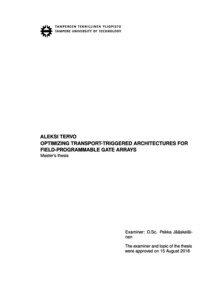Optimizing Transport-Triggered Architectures for Field-Programmable Gate Arrays
Tervo, Aleksi (2018)
Tervo, Aleksi
2018
Sähkötekniikka
Tieto- ja sähkötekniikan tiedekunta - Faculty of Computing and Electrical Engineering
This publication is copyrighted. You may download, display and print it for Your own personal use. Commercial use is prohibited.
Hyväksymispäivämäärä
2018-12-05
Julkaisun pysyvä osoite on
https://urn.fi/URN:NBN:fi:tty-201811192612
https://urn.fi/URN:NBN:fi:tty-201811192612
Tiivistelmä
With the growing importance of energy efficiency, heterogeneous computing has become more popular in recent years. Field-programmable gate array (FPGA) devices are no exception: offering highly parallel execution at low power, they are an option worth considering for many tasks, and increasingly more available for users through cloud computing services.
While FPGA devices offer a lower barrier to entry to logic design than integrated circuit design, they are still difficult to design for compared to instruction set processors. While tools exist for translating a high-level language description of an algorithm into an FPGA design, they still require expertise most software designers do not have.
One way around this problem is building soft processors onto the programmable logic as a programmability layer for sofware designers. Transport-triggered architectures (TTAs) are a promising avenue of research in this area for their simple implementation and inherently parallel programming model.
This thesis presents FPGA-centric optimizations for transport-triggered architectures and evaluation of these optimizations through synthesis. Together, these optimizations yielded between 20 and 30 percent reduction in logic utilization in the tested architectures, while having little effect on the clock frequency. Additionally, the scalability of TTAs for more parallel workloads is evaluated with various configurations of a TTA vector processor as well as a convolutional neural network processor case study.
While FPGA devices offer a lower barrier to entry to logic design than integrated circuit design, they are still difficult to design for compared to instruction set processors. While tools exist for translating a high-level language description of an algorithm into an FPGA design, they still require expertise most software designers do not have.
One way around this problem is building soft processors onto the programmable logic as a programmability layer for sofware designers. Transport-triggered architectures (TTAs) are a promising avenue of research in this area for their simple implementation and inherently parallel programming model.
This thesis presents FPGA-centric optimizations for transport-triggered architectures and evaluation of these optimizations through synthesis. Together, these optimizations yielded between 20 and 30 percent reduction in logic utilization in the tested architectures, while having little effect on the clock frequency. Additionally, the scalability of TTAs for more parallel workloads is evaluated with various configurations of a TTA vector processor as well as a convolutional neural network processor case study.
